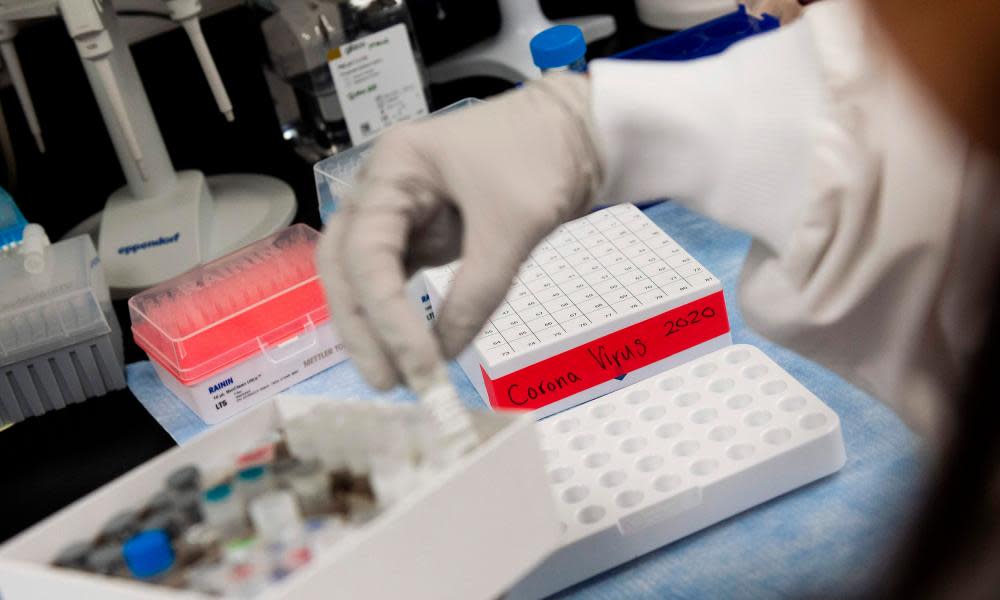UK plan to shun EU vaccine scheme ‘unforgivable’, say critics

The UK’s decision not to join an EU plan to distribute a potential coronavirus vaccine to its most vulnerable citizens has been described as “unforgivable” and condemned by health charities and opposition politicians.
On Friday, Matt Hancock confirmed that the UK would not be participating in the scheme. The health secretary said the UK’s position outside the EU would have left it without a decision-making role as negotiations over purchases were made.
The European commission has been in “intensive” talks with leading drugs manufacturers to make advance purchases of any future vaccine.
Under the joint procurement plan, the commission will then distribute doses to the Europeans in greatest need first amid an inevitable international battle to source the drugs.
Hancock said the government believed there was a quicker way to source a vaccine for Britons.
But Alex Harris, the head of global policy at the Wellcome Trust, said the EU scheme had been “morally right” and called for reassurance that the UK was not setting itself up as a competitor to the bloc.
“The EU vaccine initiative’s cap on how many doses participating countries get is the best way to ensure there is enough vaccine for those in need in the rest of the world,” he said. “Delivering vaccine according to need and not who can pay the highest price is not just morally right, but also the fastest way to end this pandemic.
“We urge the UK government to follow the EU’s lead and only secure vaccine doses for those who need it most (healthcare workers, over-65s and other vulnerable groups).”
The UK government’s decision to pull out of talks with the European commission comes despite evidence of an international battle among rich countries to buy up coronavirus drugs.
The White House has purchased much of the world supply of remdesivir, which has been used to treat coronavirus symptoms.
A spokesman for the European commission said its negotiations with manufacturers would continue and that it was believed the EU remained a big enough market for the right prices to be negotiated.
He said: “The negotiations are ongoing with a series of vaccine producers. These are intensive negotiations which the commission is carrying out on behalf of the different member states.
Related: Coronavirus vaccine tracker: How close are we to a vaccine?
“The fact that the UK has apparently said it would not join up to whatever scheme, whatever contracts, we are able to negotiate is definitely not something which is going to inform our negotiations. We believe that the EU, with its significant population, represents an interesting market for the companies with which we are negotiating.”
Sir Tim Barrow, the UK’s ambassador to the EU, brought weeks of talks over potential involvement in the scheme to a close in a letter to the European commission’s secretary-general, Ilze Juhansone, announcing that the government had “decided on this occasion not to join this internal EU initiative”.
The EU is in negotiations with the US firm Johnson & Johnson over its plans to use a €2.7bn (£2.4bn) emergency fund to seal advance purchase agreements.
The UK was eligible to be involved under a withdrawal agreement that came into force when the country left the EU on 31 January. During the transition period, ending on 31 December, the country remains in the EU’s single market and customs union.
Under Brussels’ proposed procurement scheme, the commission will finance part of the upfront costs of vaccine production in exchange for the right to buy a specified number of doses at an agreed price and timeframe.
The UK has not taken part in any of the previous EU joint procurements of personal protective equipment or ventilators despite shortages during the pandemic.
In response to the UK government’s decision to walk away from the latest initiative, Munira Wilson, the Liberal Democrats’ health spokeswoman, said: “When coronavirus is such a threat to people’s lives and livelihoods, ministers should leave no stone unturned in their bid to end the pandemic.
“This government’s stubborn unwillingness to work with the European Union through the current crisis is unforgivable.
“The crisis does not stop at any national border. It is about time the prime minister started showing leadership, including fully participating in all EU efforts to secure critical medical supplies and a vaccine.”

 Yahoo News
Yahoo News 
